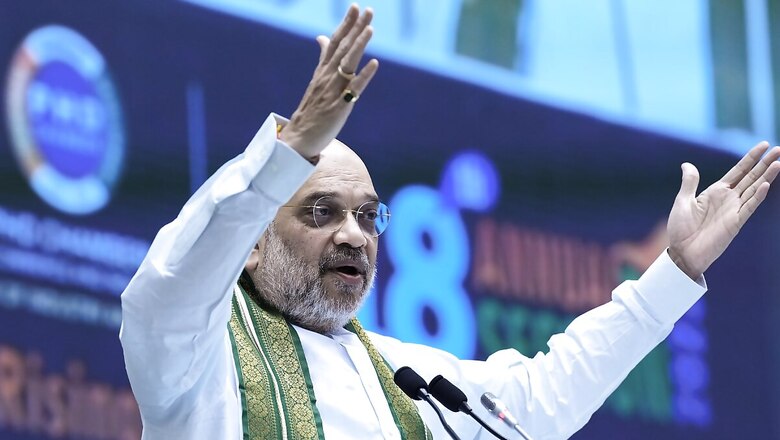
views
Cooperatives in India are governed by the State Co-operative Act and the Multi State Co-operative Act 2002, and come under the state list, which means state governments and Registrar Cooperative Society (RCS) have autonomy over matters related to changes in cooperative legislation.
Cooperatives that extend beyond the borders of one state come under the Multi State Cooperative (Amendment) Act 2022, which now brings them under the purview of the central government and Central Registrar of Cooperative Societies. There are more than 8 lakh cooperatives with a membership of 29 crore, or one-fourth of India’s population. Of these, 1,600 are registered multi state cooperative societies.
The Ministry of Cooperation headed by Union Home Minister Amit Shah has taken 52 key decisions in 26 months. These include making model by-laws for state cooperatives, thus expanding the scope of their activities, bringing all functional and viable cooperatives, numbering about 63,000, onto one operating system for the first time, pushing through the amendments in the Multi State Cooperatives Act in the recently concluded special Parliament session, and bringing out two monthly magazines — Sahkar Uday and Sahkar Jagran. These have a circulation of 3 lakh.
Existing model by-laws restricted the scope of Primary Agricultural Credit Societies (PACS) from expanding their business activities. However, with the changes, 25 new sectors like dairy, fisheries, storage, distribution of LPG, have been allowed, making PACS multipurpose and, therefore, economically viable. As many as 31 states have already accepted these.
PACS can now also function as Common Service Centers (CSC), Jan Aushadhi Kendras, and fertilizer distribution centres.
A major move has been the computeristion of PACS and linking it to the National Software Network.
“NABARD has prepared the most business friendly, most modern and technologically advanced software for PACS. Now, all the viable PACS have been integrated into the banking system through the software with District Co-operative Central Bank (DCCBs), State Cooperative Banks and NABARD,” a source in the Ministry of Cooperation said.
The software will enable the cooperatives by creating unlimited opportunities to do business and become viable economic entities. This will also pave the way for transparency in accounting processes and scrutiny at multiple levels.
To bring cooperatives at parity with the corporate, different kinds of tax relief have been given. Surcharge has been reduced from 15% to 7%. Both rural and urban cooperative banks were facing many difficulties. With the help of the Reserve Bank of India, many of these difficulties have been tackled, allowing banks to open branches, get scheduled status, one-time settlement, relief in priority sector lending, doorstep banking, increasing limit for housing loan, and allowing lending to commercial real estate
Many significant reforms have also been introduced in the sugar cooperatives, which are the largest after dairy. The first is one-time tax relief of Rs 10,000 crore to claim payments made to sugarcane farmers for the period prior to the assessment year 2016-17 as an expenditure.
Secondly, as sugar prices witness a lot of fluctuations, to diversify their activity, the government prioritised 20% ethanol blending in petrol by 2025. It has launched a scheme through National Cooperative Development Corporation (NCDC) to provide loans worth Rs 10,000 crore to cooperative sugar mills for setting up ethanol plants.
Three multi state cooperative societies at the national level have been set up to deal with production, marketing and distribution of seeds, organic produce and exports. The first will act as a platform to export the produce of the farmer, the second society will associate small farmers with the production of seeds and the third society will provide suitable price to farmers for their produce by marketing their organic products across the country and world.
Another crucial step when it comes to the multi state cooperatives is reforms in the election process and composition of board members. Cooperative Election Authority will be established to conduct free and fair elections to the board, office of the president or chairperson, vice president or vice chairperson and other board members.
If there is a vacancy of one-third in the board, elections will have to be held again. Additionally, there is a provision for representation of women and Scheduled Castes and Scheduled Tribes.
Broadly, the reforms in the Multi State Cooperative Act include creation of Cooperative Election Authority, composition of board members with reservation for women and SC/ST, strengthening governance audit mechanism and grievance redressal system, rehabilitation and reconstruction of sick cooperatives through development funds and ease of doing business.
Speaking in Parliament, Union Minister Amit Shah cited the examples of some of the most successful cooperatives.
“Amul… 36 lakh women in the country conduct a milk business worth Rs 60,000 crore and not a single woman has invested more than Rs 100 as capital. Today, there are 8.5 lakh cooperative societies with 30 crore members in 93,000 PACS, 2 lakh milk societies and many renowned cooperative societies like IFFCO, KRIBHO and Amul. Twelve cooperative banks of India are among the top 300 ranked cooperative societies,” he said.
The government is keen to see the entire cooperative sector as a “success story”, believing that through this, those with the least resources can also have a chance at prosperity.
The motto is “Sehkar se Samriddhi” (prosperity through cooperation).


















Comments
0 comment